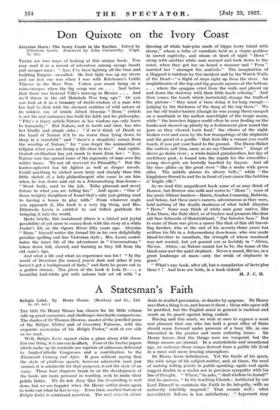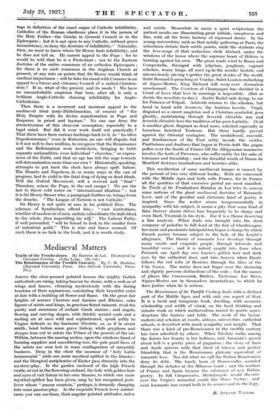A Statesman's Faith
The shades of Sir Thomas Browne, master of the jewelled prose Having said this much, we wish at once to express a most of the Religio .111e. dici and of Coventry Patmore, with the real. pleasure that one who has held a great. office of State :exquisite economies of his Religio Poetise," wait at our side should come forward under pressure of a busy life, as one
- rage in definition of the exact organ of Catholic infallibility. Catholics of the Roman _obedience place it in the perion of the Holy Father—the Greeks in General Council or in the
gpiseopate ; but it is not open to any Catholic, without grave inconsisteney, to deny the doctrine of infallibility." Naturally, . then, we want to know 'cvhere Sir Henry finds infallibility, and he does not tell us. -He cannot appeal to the Pope ; for he would be told that he is a Protestant ; nor to the Eastern doctrine of the entire consensus of an orthodox Episcopate ; for there is no such consensus in the Anglican Church at present, at any rate on points that Sir Henry would think of , cardinal importance ; will he take his stand with Cranmer in an appeal to a future and visionary Council of a united Christen- ' dom ? If so, what of the present, and its needs ? We have an uncomfortable suspicion that here, after all, is only a brilliant Anglo-Catholic claiming infallibility for Anglo- Catholicism.
Then there is a recurrent and insistent appeal to the mediaeval- ideal (ante-Hildebrandine, of course) of " the Holy Empire with its divine manifestation in Pope and Emperor, in priest and layman." No one can deny the attractiveness of this clear-cut conception, especially to a legal mind. But did it ever work itself out practically ? That there have been curious harkings-back to it, in " les idees Napoleoniennes," even in Kaiserism, no one will dispute, but is it not well to face realities, to recognize that the Renaissance and the Reforniation were world-facts, bringing to birth separate nationalities, even individual " churches," or expres- sions of the Faith, and that no age has felt the urge towards self-determination more than our own ? Historically speaking, attempts to put back the dock have alwaYS spelt failure. The Stuarts and Napoleon, in so many ways in the van of progress, had to yield to the fatal drag of dying or dead ideals. Will the Oxford Movement, will a revived and " final " Thomism, minus the Pope, in the end escape ? We are the last to throii Cold water on " international idealism " ; but it is Sir Henry Slesser who, a paragraph further on, brings down the douche. " The Leagtie of Nations is not Catholic."
Sir Henry is not quite at ease in his political Zion. The schemes of Syndicalism offend him ; " vast institutions, Whether of masters or of men, unduly subordinate the individual to the whole, thus imperilling his wilj." The Labour Party, if well persuaded, " will be forced to look to the smaller form of induatrial guild." This is wise and brave counsel. Of such there is no lack in the book, and it is worth study.























































 Previous page
Previous page